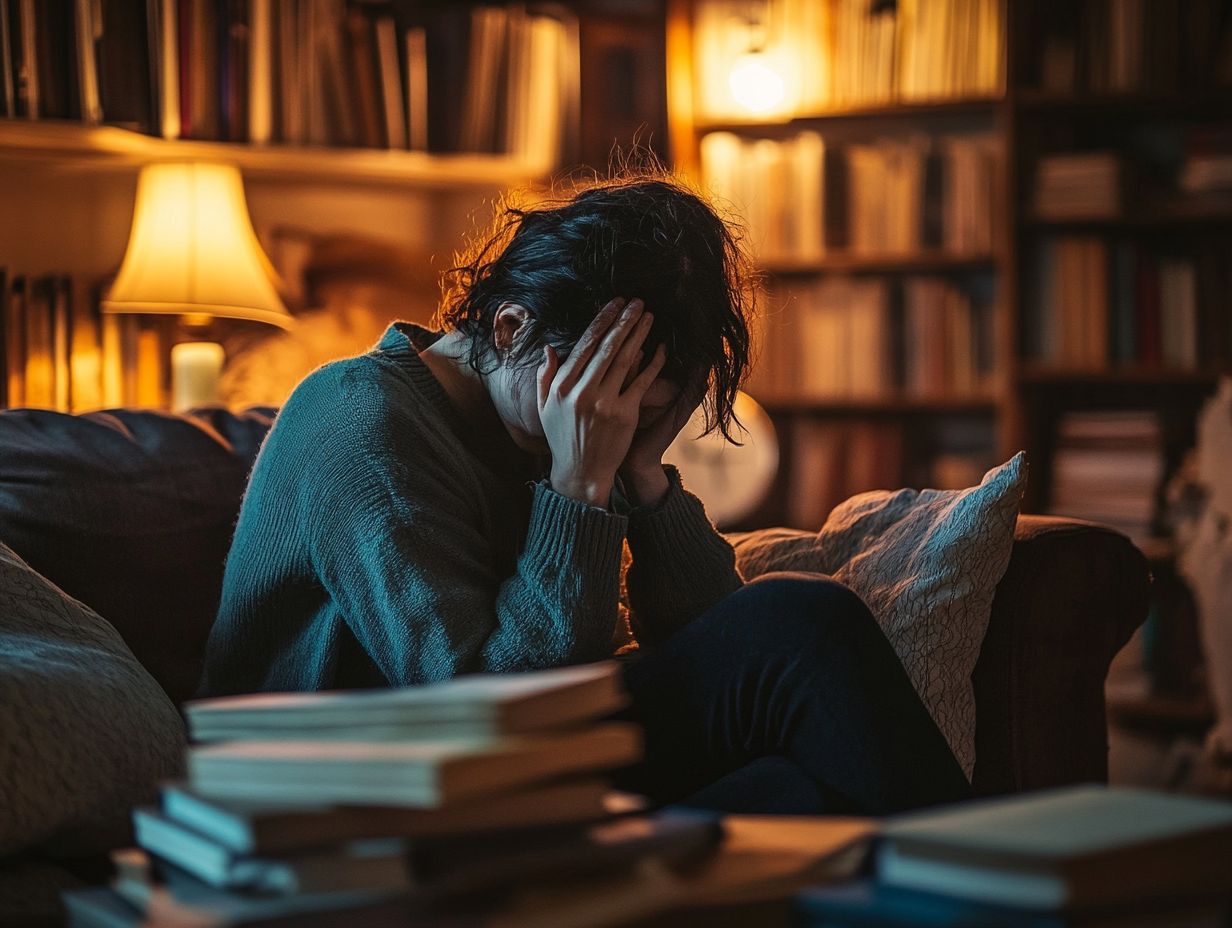Understanding the Link Between Anxiety and Behavior
Anxiety is a prevalent yet often misunderstood condition. It can profoundly affect your behavior and daily life.
You may experience various anxiety disorders, each with unique symptoms. Discover how anxiety impacts your life and relationships!
You ll learn effective coping strategies and understand when seeking professional help is essential. Join us as we explore the complexities of anxiety and how to navigate its challenges with confidence.
Contents
Key Takeaways:

- Anxiety significantly impacts behavior. It can cause physical, emotional, and cognitive changes, including triggers that affect daily life.
- Common anxiety disorders include generalized anxiety disorder, panic disorder, and social anxiety disorder. Each has its unique symptoms.
- Anxiety greatly affects relationships, work performance, and social interactions. Seeking support and coping strategies can help manage anxiety and improve well-being.
Anxiety and Its Effects on Behavior
Anxiety shapes your behavior. It influences how you react to both internal feelings and outside situations. You may notice shifts in your emotional responses and coping strategies, impacting your mental health.
For individuals dealing with anxiety disorders like social anxiety or agoraphobia, daily life can be challenging. Symptoms often include being overly alert and distress responses, which might lead to repeated actions that feel necessary or avoidance tactics.
Understanding the relationship between anxiety and behavior is key to creating effective treatments tailored to your needs.
Exploring the Connection
The connection between anxiety and behavioral patterns runs deep. Your emotional responses are shaped by childhood experiences and any trauma you faced. These can lead to emotional instability and a tendency for negative self-talk.
Your formative years are crucial in shaping your self-worth, affecting how you see yourself and engage with the world. Childhood trauma can trigger reactions within your nervous system, making you overly sensitive to feelings. As you grow, these reactions may manifest as anxiety, hindering your resilience and ability to cope with stress.
This ongoing cycle of anxiety can distort your emotional health, creating a narrative centered on feelings of inadequacy or fear. Understanding your early experiences can be the key to overcoming your challenges!
Common Types of Anxiety Disorders
Common anxiety disorders include social anxiety, agoraphobia, obsessive-compulsive disorder (OCD), and generalized anxiety disorder. Each condition has its distinctive symptoms, impacting emotional well-being and daily functioning.
By understanding these nuances, you can address your experiences more effectively.
Don t let anxiety control your life. Take the first step toward understanding it today!
Symptoms and Characteristics

Symptoms of anxiety disorders can vary widely, often appearing as emotional reactions. These manifestations can significantly impact your overall quality of life.
Compulsive behaviors and hypervigilance are also common. Emotional dynamics are frequently triggered by specific situations or thoughts, leading to distress responses that can feel utterly overwhelming. For example, you might find yourself gripped by an intense wave of panic in crowded places, prompting you to avoid such environments entirely.
Compulsive behaviors, like excessive checking or counting, may emerge as attempts to regain control over anxiety triggers, illustrating a seemingly futile struggle to manage feelings of uncertainty. Hypervigilance can keep you on high alert, constantly scanning for potential threats, which can result in chronic exhaustion and emotional burnout.
Understanding these symptoms helps you grasp how anxiety affects your daily life.
Impact of Anxiety on Daily Life
Anxiety can profoundly influence your daily life, affecting your relationships, work performance, and social interactions. It manifests through changes in behavior and emotional instability, subtly yet significantly altering how you engage with the world around you.
Relationships, Work, and Social Interactions
Social anxiety can present significant challenges in your relationships and workplace dynamics, creating barriers that impede effective communication and emotional well-being.
When you find yourself grappling with overwhelming feelings of apprehension or fear during social interactions, it can profoundly impact your ability to connect with others, both personally and professionally. These feelings can strain your relationships, lead to missed opportunities for collaboration, and contribute to a general decline in your emotional health.
You can explore various coping strategies to tackle these issues. Mindfulness practices boost self-awareness, and cognitive-behavioral techniques encourage positive thinking. Embracing personal growth through gradual exposure to anxiety-inducing situations can also bolster your confidence and improve your interactions. Ultimately, this proactive approach can strengthen your interpersonal connections and foster greater harmony in the workplace.
Coping Strategies for Anxiety
It’s crucial to implement effective coping strategies for managing anxiety and enhancing emotional well-being. One prominent approach you might consider is cognitive behavioral therapy (CBT), which has proven highly effective in various therapeutic settings.
Effective Techniques and Therapies

Cognitive behavioral therapy (CBT) stands out as one of the most effective methods for managing anxiety, honing in on the transformation of negative thought patterns and behaviors to enhance your overall emotional well-being.
This therapeutic approach gives you the power to recognize and challenge irrational beliefs, paving the way for healthier emotional responses. By utilizing targeted strategies such as exposure therapy, a method that gradually exposes you to situations that cause anxiety, or cognitive restructuring to reframe distressing thoughts you can cultivate robust coping mechanisms.
CBT underscores the significance of adopting behavioral changes that foster resilience, like mindfulness practices and relaxation techniques. This allows for improved management of anxiety in your everyday life. Many clients discover that through the consistent application of these techniques, they not only alleviate their immediate symptoms but also nurture a more enduring emotional stability.
Seeking Help for Anxiety
Understanding when to seek professional help for anxiety is essential for effective management, especially when symptoms begin to disrupt daily life and emotional well-being.
Recognizing the signs that indicate it’s time to reach out can be a pivotal step toward regaining control and fostering a healthier mindset. Seeking help from a therapist or counselor can greatly assist in managing anxiety.
When to Seek Professional Support
Recognizing the signs of emotional instability and persistent anxiety symptoms is crucial for determining when you should seek help from a therapist or mental health professional.
You might find yourself grappling with overwhelming feelings of distress that disrupt your daily routines, whether it s work, relationships, or even self-care.
This emotional turmoil can manifest as unpredictable mood swings, relentless worry, and difficulty concentrating.
You may notice a shift in your emotional landscape, where stressors that once felt manageable now trigger intense anxiety responses. It s essential to reflect on whether these distress signals are affecting your overall quality of life.
If you find yourself constantly on edge, weighed down by sadness, or struggling to manage everyday situations, this is a clear sign you should take action now! It may be time to seek professional assistance.
Frequently Asked Questions
What is the link between anxiety and behavior?

The link between anxiety and behavior refers to how anxiety can impact an individual’s actions, reactions, and overall behavior. Anxiety can make you avoid situations, feel irritable, or struggle to focus, often exacerbated by emotional dynamics rooted in childhood experiences.
How does anxiety affect behavior?
Anxiety can affect behavior in various ways. It can lead to avoidance of certain situations, increased agitation or irritability, changes in eating or sleeping patterns, and difficulty concentrating.
In extreme cases, anxiety can also lead to self-destructive behaviors, revealing the necessity for effective ways to handle anxiety.
Can anxiety cause behavior problems?
Yes, anxiety can cause behavior problems. When left untreated, anxiety can lead to disruptive or harmful behaviors, such as aggression, self-harm, or substance abuse.
You should address anxiety to prevent these behavior problems.
What are some common behaviors associated with anxiety?
Common behaviors associated with anxiety include:
- Avoidance
- Restlessness
- Irritability
- Muscle tension
- Difficulty concentrating
- Changes in eating or sleeping habits
These behaviors may vary depending on the individual and the severity of their anxiety.
How can understanding the link between anxiety and behavior help?
Understanding the connection between anxiety and behavior can help individuals recognize and address their anxiety more effectively. It can also assist loved ones and professionals in better understanding and supporting someone with anxiety, promoting a more positive and understanding environment.
Yes, there are various ways to manage anxiety-related behaviors. These may include therapy, medication, relaxation techniques, and lifestyle changes.
It is important to seek professional help to determine the best course of action for managing anxiety and its related behaviors. Don t hesitate reach out to a professional today!






